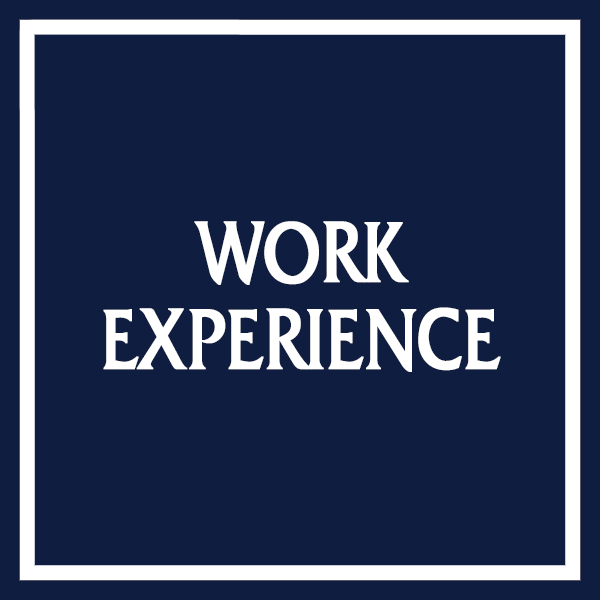WORK EXPERIENCE EDUCATION DEPARTMENT
Courses offered assist students in acquiring desirable work habits, attitudes, career awareness and other professional skills. Internship courses are a bridge between classroom learning and work with the internship directly related to the students’ major. Work Experience students apply employability skills known as “soft skills” in a work environment. Soft skills include teamwork, effective communication, time management, adaptability, and problem solving. The skills learned in Work Experience courses help students develop skills that support career and college success.
- BENEFITS TO ENROLLING IN COURSES
BENEFITS TO ENROLLING IN COURSES
- Improve your effectiveness in the workplace while exploring career paths of interest
- Learn the skills that will support advancement in your career
- Connect your classroom learning to your career by applying the skills you have learned
- Apply goal-setting techniques to achieve greater success both professionally and personally
- Earn college credit toward a certificate, degree, or to transfer to any California State University (CSU)
- Meet full-time student status for financial or other programs
- Your job site is your classroom - no transportation needed to get to class
- Develop the 21st century job skills that employers seek: communication, customer service, professionalism/work ethic, time management, motivation/initiative, flexibility/adaptability, leadership, interpersonal skills, teamwork, technology
- LOOKING FOR A JOB?
LOOKING FOR A JOB?
In order to be eligible for a work experience course, students must acquire a job, internship, or volunteer position (Community Engagement).
Students can find a open positions using the college's online job board: Handshake. For those who wish to take a Community Engagement course, feel free to also use our Volunteer Resource Guide.
- FOR HIGH SCHOOL STUDENTS: HOW TO ENROLL
HIGH SCHOOL STUDENTS ENROLLING IN WORK EXPERIENCE
High school students are able to take work experience courses. Enrollment at SRJC is handled by your high school and the SRJC Admissions & Records (A&R) Department.
HIGH SCHOOL DUAL ENROLLMENT STUDENTS
WHAT YOU NEED TO KNOW
This is a self-directed course. You will be assigned an instructor who will answer your questions and support your success, but it is up to you to fulfill the course requirements without prompting. Students' privacy is protected by the Family Educational Rights and Privacy Act (FERPA) Guidelines. Instructors and support staff are not permitted to answer inquiries from a student's parents. It is your responsibility to pay attention to course deadlines (outlined in the course handbook) as well as Admissions & Records deadlines (outlined in the Academic Calendar). This is a graded course. The grade you get in this course will become part of your college record.
HIGH SCHOOL STUDENTS - COURSE REQUIREMENTS
- You must have a paid job with a properly licensed business
- Complete an application to enroll at SRJC Complete a Concurrent Enrollment Form
- Enroll in the approved Work Experience course through your student portal
COURSE REQUIREMENTS
- Students must be employed by any licensed business prior to enrollment in the course.
- Enroll in a Work Experience course
- Develop 3 on-the-job learning goals with your supervisor that focus on new job-related knowledge or skills.
- Meet with your assigned Work Experience instructor at least twice during the semester in person or with the exception is zoom
- Write a 3-page report about your experience in the course.
- Resume
- Complete 1 work-related workshop or activity (offered online)
- Keep track of the total hours worked for reporting to your Assigned Instructor at your 2nd job site visit.
WORK PERMIT LAWS
WORK PERMIT LAWS
Excerpts are taken from the State of California Child Labor Laws:
High school graduates or minors who have been awarded a certificate of proficiency are exempt from the permit requirements. [EC 49101; LC 1286]
A minor enrolled in a Work Experience Education program must obtain a work permit, and his or her employer must possess a permit to employ. The minor must be at least 16 years of age to be enrolled in a Work Experience Education program, with certain exceptions as specified in the Education Code. [EC 49113]
Obtaining Permits to Employ and Work
Prior to permitting the minor to work, employers must possess a valid Permit to Employ and Work. The minor’s school issues the permit. In typical circumstances, after an employer agrees to hire a minor, the minor then obtains from his or her school a brief form with the title “Statement of Intent to Employ Minor and Request for Work Permit” (“Application”). [EC 49162] The application is completed by the minor and the employer and signed by the minor’s parent or guardian and the prospective supervisor. [EC 49163] After returning the completed and signed application to the school, school officials may then issue the Permit to Employ and Work. [EC 49110 – 49113 and 49130]
Minors Who Attend a Charter School
A minor attending a charter school* who wishes to work must obtain the standard Permit to Employ and Work, and the employer must possess such permit. Either the minor’s school or the authority that granted the school’s charter (normally the local school district) may issue the permit.
Work Hour Exceptions for Sixteen and Seventeen Year Olds
Sixteen and seventeen-year-olds enrolled in Work Experience or cooperative vocational education programs approved by the California Department of Education or those conducted by private schools may work on any day after 10 p.m., but not later than 12:30 a.m., provided that the parent or guardian and the Work Experience Education coordinator approve. Such employment may not be detrimental to the health, education, or welfare of the minor. Minors in these programs who work between the hours of 10 p.m. and 12:30 a.m. must be paid at least the adult minimum wage for those hours. [LC 1391.1] As the chart indicates, 16 and 17 year olds enrolled in a school approved Work Experience or cooperative vocational education program may work more than 4 hours on a school day, but never more than eight hours in any day. [EC 49116, LC 1391 and 1392].
REPEATABILIY LIMIT:
Work Experience courses are "variable unit courses" and can be taken multiple times. The work experience and internship courses can be taken for a combined maximum of 16.00 units, and the community engagement courses can be taken for a maximum of 3.00 units while attending SRJC.
TRY OUT WORK EXPERIENCE! LEARN! EARN! ACHIEVE!


